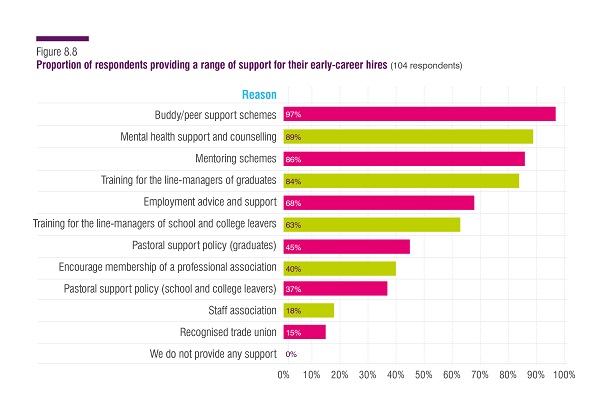With staff retention fast becoming a priority, ISE researcher Nicola Thomas, explains why graduates and apprentices quit their jobs and how they can be retained.
Retention is a core commercial aim for development programmes as employers are keen to both retain the talent they have invested in and to see graduates and apprentices flourish within their organisation.
However, graduate turnover during the pandemic climbed to the highest level since we started collecting the data. Companies are now retaining 72% of their graduates thee years after they join, down from 79% in 2011.
Retention of staff straight out of school or college has also sunk to the lowest level since 2019 when we started collecting the data – 71% after three years, compared to 77%.
With so many people considering moving to pastures new, employer attention is on retention.
By delving into ISE’s Student Development Survey 2022 we can better understand why graduates and apprentices leave and the activities employers can deploy to retain them.
Why graduates and apprentices quit
When we look at retention rates the most important thing to understand is why employees are leaving the organisation in the first place.
Our survey showed that the most common reason for leaving is to move to a different company with 51% of leavers quoting this as their main reason.
However, some interesting differences compared to 2021 is the increase in early graduates and apprentices moving to a different type of work – a 24% increase compared to last year.
Nearly half (40%) of early career professionals also state that dissatisfaction with their pay is the reason for leaving, in comparison this number was only 28% in 2021.
With stagnating salaries over the last couple of years and the skyrocketing costs of living in the UK it’s not surprising that young professionals are leaving jobs to try and increase their wages.
The wellbeing factor
As we move into a post pandemic job market, early career professionals face many challenges.
We know that isolation and home working put people in professional occupations at higher risk of developing mental health issues. This year’s Development Survey found that 17% of young professionals sought mental health support at work in 2022. And 61% of employers reported that demand for mental health support has increased throughout the pandemic.
This highlights the need for employers to make sure they’re prioritising the wellbeing of their early career hires to ensure they’re getting the support they need and increase their chance of retaining them.
The power of the pound
With current UK inflation hitting record levels and the house of commons reporting that 83% of UK adults will be impacted by the increased cost of living, many employees will also be feeling the pinch in their wallets.
For many young professionals a reduction in spending power might mean that they’ll switch roles more frequently as they try to increase their wages in line with increasing costs.
This will put salary and other financial benefits at the forefront of most workers’ minds as they look for new roles. Employers need to ensure they are in tune with the job market if they want to be able to secure the best student hires.
You can read about what the typical graduate and apprentice salaries look like in my last blog.
How employers retain hires
Employers provide a range of support for their early-career hires. Buddy schemes dominate yet it’s interesting to see that 89% of respondents offer mental health support and counselling. This highlights the increasing focus and destigmatisation of languishing mental health in the early careers space.
Simon Reichwald’s blog explains more on retention and the 3 underused tools for retaining talent

Given there are several reasons why early career professionals decide to leave their roles, it’s important that employers keep conducting exit interviews. Understanding why employees are leaving is vital to respond to changing demands in the market and maximise retention rates.
Read ISE’s Student Development Survey 2022
Read more from ISE researcher Nicola Thomas


0 Comments